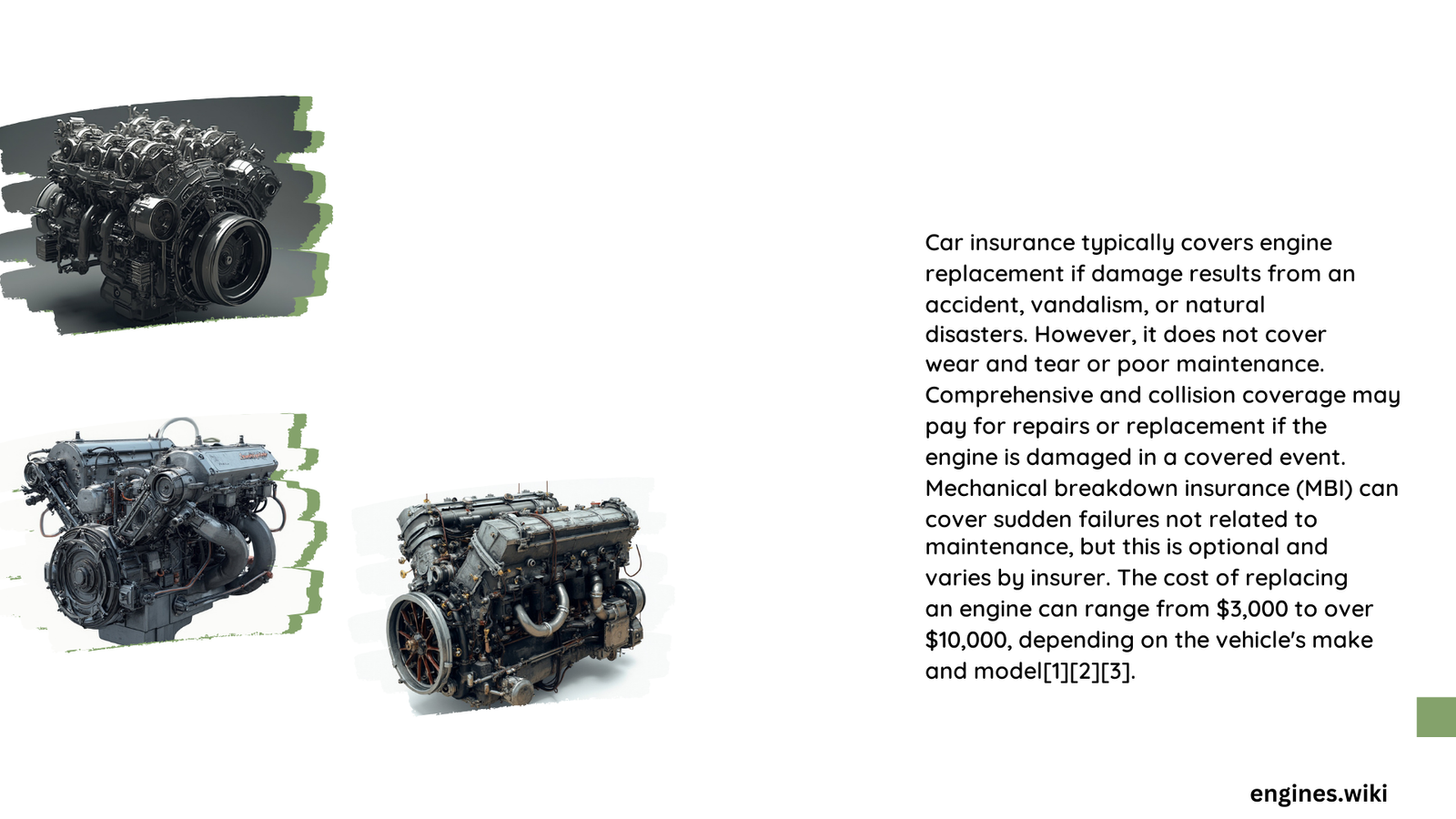When your car needs a new engine, it can be a significant financial burden. Understanding your insurance options and coverage for engine replacement is crucial. This article explores the intricacies of car insurance related to engine replacement, including coverage options, claim processes, and common challenges faced by vehicle owners.
What Are the Specific Coverage Options for Engine Replacement Costs?
Engine replacement is a major expense that can catch many car owners off guard. Standard auto insurance policies typically don’t cover engine failure due to wear and tear or mechanical issues. However, there are specific coverage options that might help in certain situations:
-
Comprehensive Coverage: This may cover engine damage resulting from non-collision incidents such as theft, vandalism, or natural disasters.
-
Collision Coverage: If your engine is damaged in a collision, this coverage might apply.
-
Engine Protection Add-on: Some insurers offer specialized add-ons that cover engine damage, including the gearbox.
It’s important to note that these coverages have limitations and exclusions. For instance:
- General maintenance negligence
- Mechanical failure not resulting from a covered event
- Normal wear and tear
are typically not covered under standard policies.
How Does Engine Failure Insurance Coverage Work?

Understanding the mechanics of engine failure insurance coverage is crucial for car owners. Here’s what you need to know:
Claim Amounts
The claim amount for engine failure can vary significantly depending on:
- Extent of damage
- Cost of repairs or replacement
- Coverage limits in your policy
If you have an engine protector add-on, the claim amount would be limited to the coverage specified in that policy.
Required Documentation
To file a claim for engine failure, you’ll typically need to provide:
- Detailed mechanic’s report
- Proof of regular maintenance
- Police reports (if applicable)
- Any additional documentation required by your insurer
Claim Processing Time
The time it takes to process an engine failure claim can vary, but generally ranges from several days to a few weeks. Factors affecting processing time include:
- Complexity of the claim
- Promptness in providing required documentation
- Insurer’s workload and efficiency
What Are the Conditions and Specifications of Car Warranties for Engine Issues?
Car warranties can provide additional protection for engine issues, but it’s crucial to understand their terms and conditions:
Coverage Duration
| Warranty Type | Typical Duration | Mileage Limit |
|---|---|---|
| New Car | 3-5 years | 36,000-60,000 miles |
| Extended | Varies | Often higher limits |
Components Covered
Most warranties cover major engine components such as:
- Engine block
- Cylinder head
- Gearbox
However, wear and tear items like spark plugs, belts, and hoses are often excluded.
What Are Common Challenges When Filing Insurance Claims for Engine Repair?
Filing an insurance claim for engine repair can be complex. Here are some common challenges:
-
Proving Cause of Failure: Demonstrating that the engine failure was due to a covered event rather than wear and tear or lack of maintenance.
-
Meeting Documentation Requirements: Gathering all necessary evidence, including mechanic reports and maintenance records.
-
Navigating Exclusions: Understanding and working within the limitations of your policy.
-
Potential Claim Denial: Claims may be denied if:
- The failure is due to maintenance negligence
- It’s considered normal wear and tear
- The driver was under the influence or driving without a valid license
How Can You Prepare for Potential Engine Replacement Costs?
Given the limitations of standard insurance policies, it’s wise to prepare for potential engine replacement costs:
-
Regular Maintenance: Keep up with scheduled maintenance to prevent premature engine failure.
-
Emergency Fund: Set aside money specifically for car repairs and emergencies.
-
Extended Warranty: Consider purchasing an extended warranty that covers major engine components.
-
Engine Protection Add-on: If available, add engine protection coverage to your insurance policy.
-
Research Repair Options: Familiarize yourself with reputable mechanics and potential costs in advance.
What Should You Do If Your Car Needs a New Engine and Insurance Won’t Cover It?
If you find yourself needing a new engine and your insurance won’t cover it, consider these options:
-
Negotiate with the Mechanic: Some repair shops offer payment plans or discounts.
-
Explore Financing Options: Personal loans or credit cards might help spread the cost.
-
Consider a Rebuilt Engine: This can be more cost-effective than a brand new engine.
-
Weigh Repair Costs vs. Car Value: If the repair cost exceeds the car’s value, it might be time to consider a replacement vehicle.
-
Seek a Second Opinion: Another mechanic might offer a different diagnosis or more affordable solution.
In conclusion, while standard car insurance policies may not cover engine replacement due to wear and tear or mechanical failure, understanding your coverage options and preparing for potential costs can help mitigate the financial impact of needing a new engine. Regular maintenance, appropriate insurance add-ons, and financial planning are key to managing this significant automotive expense.
